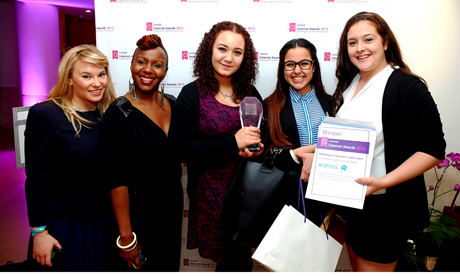Chat-up line advice from local Oiimysize Project

The Oiimysize website aims to teach young men about pick-up line etiquette. Here, the creators of the website, (left to right) Isabel Chapman, Anne-Marie Reid, Shanice George, Sana Sodki, Savannah Ali
The Urban Dictionary, an online compendium of streetwise youth lingo, lists ‘wifey’ as a definition of ‘Oiimysize’.
But to avoid further confusion for baffled older readers, let’s just say that it can be roughly translated as ‘You’re my type’ or ‘I fancy you’.
Oiimysize is also the name of a project, developed by young members of Dream Arts, that aims to send a message to teenage boys about the (sometimes intimidating) way in which they approach girls.
“The girls were telling me their stories about how guys approached them and how it could be actually quite abusive,” explains Dream Arts programme manager Ann-Marie Reid. “From that I asked them if they would like to maybe create some sort of awareness. They got together and came up with the idea of a magazine style website which could highlight how cheesy chat-up lines could actually be quite intimidating.”
The award-winning website features a ‘Rate My Churpz’ section where visitors can judge boys’ chat-up lines and is the result of a bespoke media training programme put together for Oiimysize by Hackney design agency Mediorite and developed as part of the Peabody Trust’s Staying Safe campaign.
The chat-up lines range from the well-meaning but obvious (“What’s your name?”) to the sleazy (“I can’t taste my lips, can you taste them for me?”) and the downright offensive (“Do you know I’m invisible? I’ll be with you in the night, and by morning I’ll be dust”).
There is also a section on the Oiimysize website containing worrying facts about ‘sexting’, or the texting of indecent images.
It states: “A 2009 UK survey of 2,094 teens aged 11 to 18 found that 38% had received an ‘offensive or distressing’ sexual image by text or email.”
The website also contains this legal advice: “If you’re a teenager in possession an indecent image of another minor (someone under 18), technically you are in possession of an indecent image of a child. This is an offence under the Protection of Children Act 1978 and the Criminal Justice Act 1988. If you then forward this on, you are committing a further offence of distribution.”
The girls who created the website have uploaded videos of themselves confronting boys who have their faces covered about their threatening approaches.
The boys in these videos can be heard trying their best to talk the girls round, but what is apparent as that they have no idea what is appropriate and what is not.
One lad, Adrian, starts off well with a twenty questions technique. He asks one girl, Michaela, her name, where she is from, what school she goes to… and then it all goes predictably pear-shaped.
“How do you get to school?” he asks.
“On my bike” she replies, to which the boy responds: “You can ride on my bike anytime”
It is as though she has been waiting for this, and her face twists into angry disappointment.
“See this is what I mean,” she tells him. “I don’t like when boys do that, why you got to do that? That just turns girls off.”
The girls then speak to camera and explain how the words made them feel.
“Basically, I thought what Adrian said about being beautiful was nice,” says Michaela. “I liked that, it made me feel he was quite a nice guy and that he knows how to compliment someone. But when he said he wants me to ride on his bike it made me feel like dirt, like I’m just trash, like I’m any girl on the street’,
The response from another unlucky volunteer who had to put up with a volley of passive aggressive ‘churpz’ was also uncomplimentary: “Do you just think about how to make a girl vomit?”
Shanice George, 16, one of the leading members of Oiimysize, said she thought the boys did not even realise they were being that offensive.
“I was the one who filmed Rate My Churpz,” she says. “When we did the filming they only had five minutes to think, so that was their actual reaction. Afterwards they had to think twice about it. We think the videos changed a lot of people’s point of view.”
The chat-up lines on the videos are a funny and clever way of highlighting what is actually a serious issue amongst young men and women. It calls to mind work by The Everyday Sexism project, which aims to fight the normalisation of sexist behavior. Crucially, however, the Oiimysize project as is evident from its brilliant name, gears itself towards adolescents and in changing attitudes on their own terms.
Lucy Ferguson, from Mediorite, says: “It is succeeding where mainstream feminism and PSHE classes are not, in teaching young women about how to have healthy relationships. The
real value in this campaign is that the girls are reaching out to people of a young age.”
“Staying Safe has been widely well received because it mixes youth leadership approach with media specific training and investment in creating professional standard platforms and assets. The young leaders sign a contract that means they agree to deliver workshops and promotion of their campaign to peers.”
Shanice George thoroughly enjoyed working with Dream Arts and Mediorite and feels the experience has helped her get into the prestigious BRIT school, where she starts in September.
“It was a really good experience,” she said, “in terms of the people I’ve been able to work with and the things I’ve been able to learn. Other 16-year-olds can’t say they have had that.”
